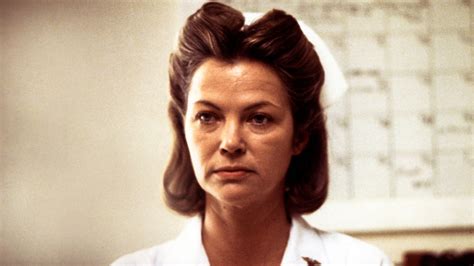Cuckoo's Nest Nurse Ratched

The character of Nurse Ratched, from Ken Kesey's novel "One Flew Over the Cuckoo's Nest," has become an iconic symbol of oppressive authority and control in American literature. Played by Louise Fletcher in the 1975 film adaptation, Nurse Ratched is the strict and unyielding head nurse of a psychiatric hospital, where she exercises total control over the patients and staff. Her character serves as a powerful exploration of the themes of individualism, free will, and the dangers of unchecked institutional power.
The Character of Nurse Ratched: A Study in Oppressive Authority

Nurse Ratched’s character is a masterful creation, embodying the qualities of a strict, manipulative, and emotionally distant authority figure. Her rigid adherence to hospital rules and protocols is matched only by her determination to crush the spirits of her patients, suppressing any form of dissent or nonconformity. Through her actions, Kesey critiques the dehumanizing effects of institutional control, highlighting the ways in which oppressive authority can stifle individuality and creativity. Her character has become a cultural touchstone, symbolizing the dangers of unchecked power and the importance of individual freedom.
The Psychological Impact of Nurse Ratched’s Authority
The patients in the hospital are deeply affected by Nurse Ratched’s oppressive regime, with many becoming withdrawn and submissive in response to her strict control. The character of R.P. McMurphy, played by Jack Nicholson in the film adaptation, serves as a foil to Nurse Ratched, challenging her authority and pushing the boundaries of acceptable behavior. Through their conflict, Kesey explores the psychological effects of institutional control, highlighting the ways in which oppressive authority can damage individual self-esteem and autonomy. The novel and film adaptation of “One Flew Over the Cuckoo’s Nest” have become classics of American literature and cinema, with Nurse Ratched’s character remaining a powerful and enduring symbol of the dangers of unchecked institutional power.
| Character Trait | Description |
|---|---|
| Authoritarian | Exercises total control over patients and staff |
| Manipulative | Uses guilt, shame, and intimidation to control behavior |
| Emotionally Distant | Lacks empathy and compassion for patients |
| Strict | Adheres rigidly to hospital rules and protocols |
| Intimidating | Uses her authority to inspire fear and submission |

Key Points
- Nurse Ratched is a symbol of oppressive authority and control in American literature
- Her character serves as a critique of the dehumanizing effects of institutional control
- The conflict between Nurse Ratched and R.P. McMurphy explores the psychological effects of institutional control
- Nurse Ratched's character has become a cultural touchstone, symbolizing the dangers of unchecked power
- The novel and film adaptation of "One Flew Over the Cuckoo's Nest" are classics of American literature and cinema
The character of Nurse Ratched has had a lasting impact on popular culture, with her name becoming synonymous with oppressive authority and control. Her influence can be seen in countless works of literature, film, and television, with many authors and creators drawing inspiration from her iconic character. As a symbol of the dangers of unchecked institutional power, Nurse Ratched remains a powerful and enduring figure in American cultural consciousness.
The Legacy of Nurse Ratched: Cultural Impact and Enduring Relevance

Nurse Ratched’s character has been the subject of numerous academic studies and critical analyses, with scholars exploring her significance in the context of feminist theory, psychology, and sociology. Her influence can be seen in the work of authors such as Margaret Atwood and Sylvia Plath, who have written about the dangers of oppressive authority and the importance of individual freedom. The character of Nurse Ratched has also been referenced in popular culture, with numerous films, television shows, and songs referencing her iconic character.
Nurse Ratched in Popular Culture: References and Allusions
Nurse Ratched’s character has been referenced and alluded to in countless works of popular culture, including films such as “The Silence of the Lambs” and “Girl, Interrupted.” Her influence can also be seen in television shows such as “The Handmaid’s Tale” and “Orange is the New Black,” which explore themes of oppressive authority and individual resistance. Through her enduring legacy, Nurse Ratched remains a powerful symbol of the dangers of unchecked institutional power and the importance of individual freedom and autonomy.
What is the significance of Nurse Ratched's character in American literature?
+Nurse Ratched's character is significant because she represents the dangers of oppressive authority and the importance of individual freedom and autonomy. Her character serves as a critique of the dehumanizing effects of institutional control and has become a cultural touchstone, symbolizing the dangers of unchecked power.
How has Nurse Ratched's character influenced popular culture?
+Nurse Ratched's character has had a lasting impact on popular culture, with her name becoming synonymous with oppressive authority and control. Her influence can be seen in countless works of literature, film, and television, with many authors and creators drawing inspiration from her iconic character.
What is the psychological impact of Nurse Ratched's authority on the patients in the hospital?
+The patients in the hospital are deeply affected by Nurse Ratched's oppressive regime, with many becoming withdrawn and submissive in response to her strict control. Her character serves as a powerful exploration of the psychological effects of institutional control, highlighting the ways in which oppressive authority can damage individual self-esteem and autonomy.
In conclusion, the character of Nurse Ratched is a powerful and enduring symbol of the dangers of unchecked institutional power and the importance of individual freedom and autonomy. Through her iconic character, Ken Kesey critiques the dehumanizing effects of institutional control, highlighting the ways in which oppressive authority can stifle individuality and creativity. As a cultural touchstone, Nurse Ratched remains a relevant and thought-provoking figure in American cultural consciousness, inspiring new generations of readers, writers, and creators to explore the complexities of human nature and the importance of individual freedom.
